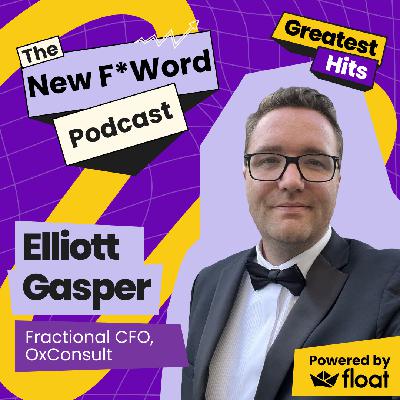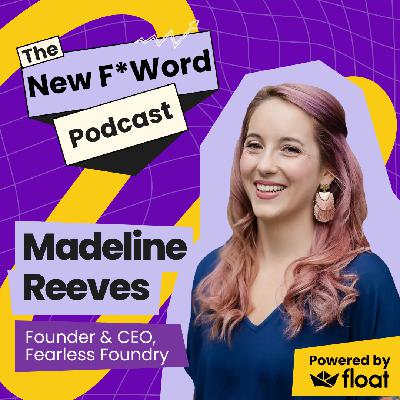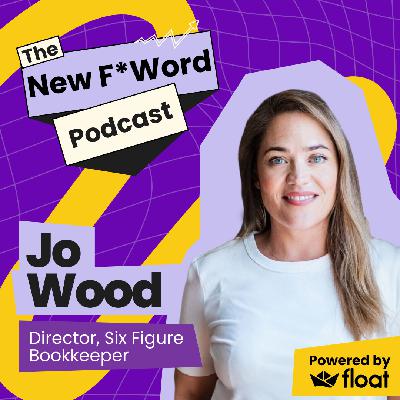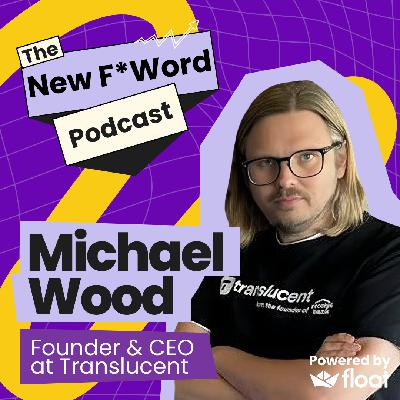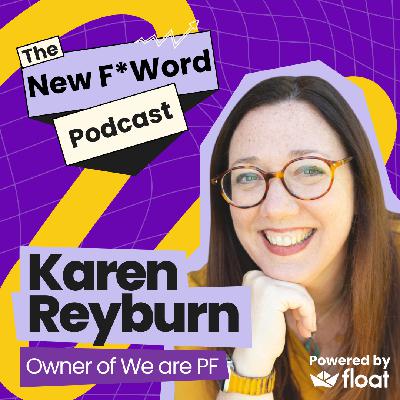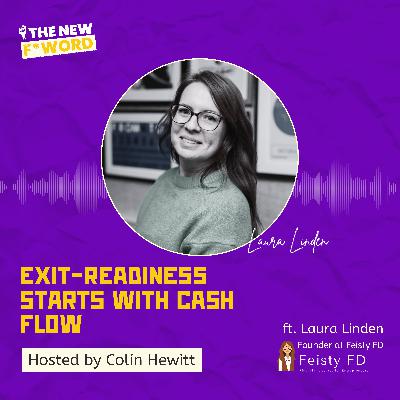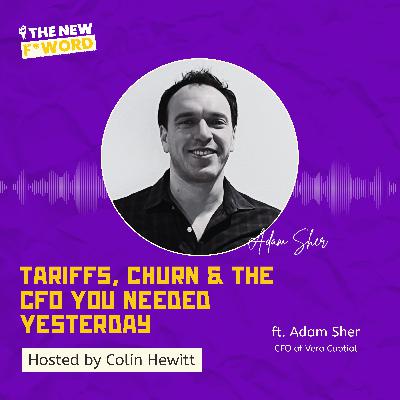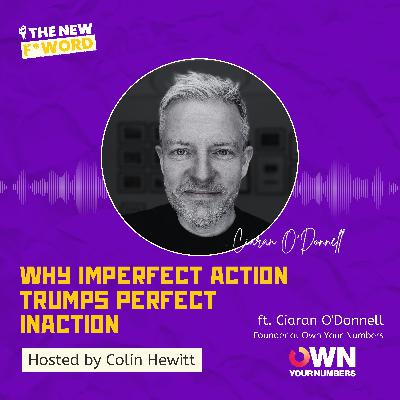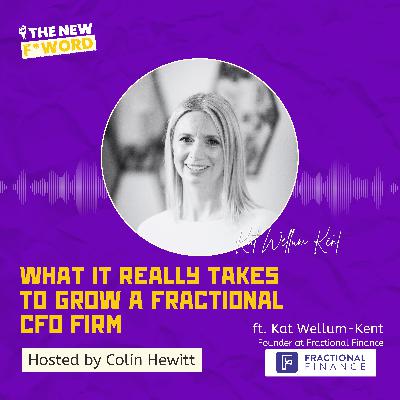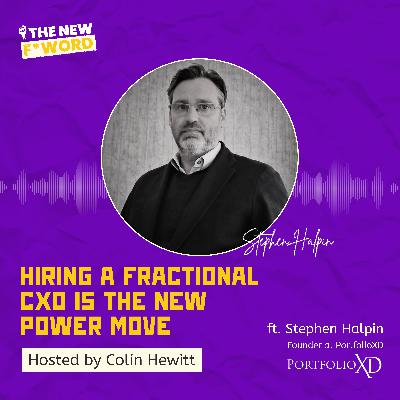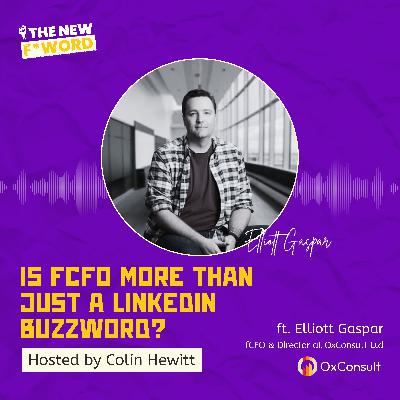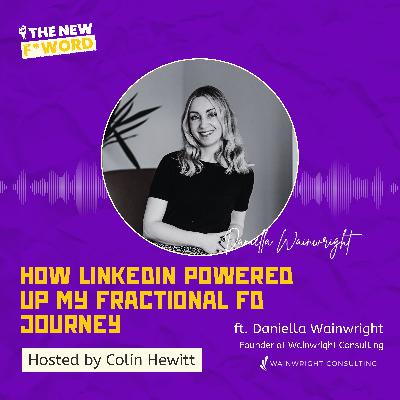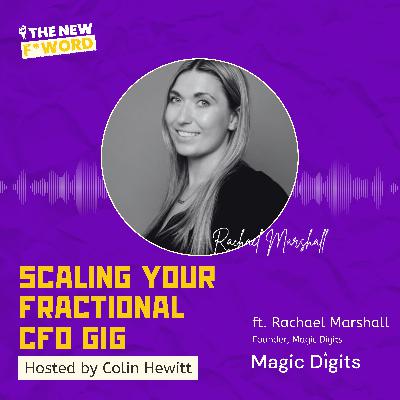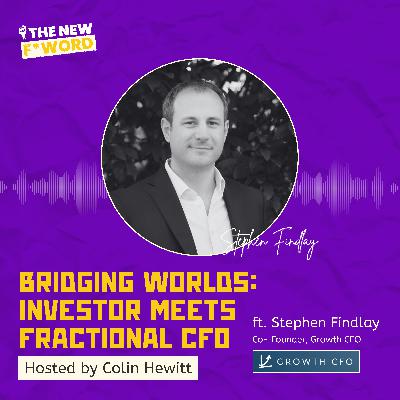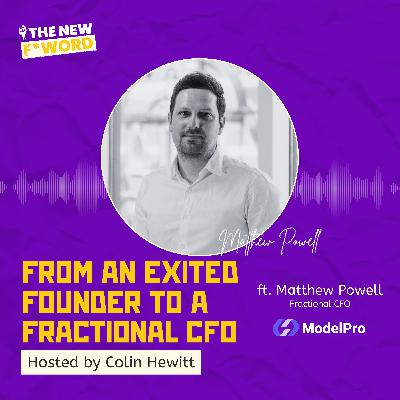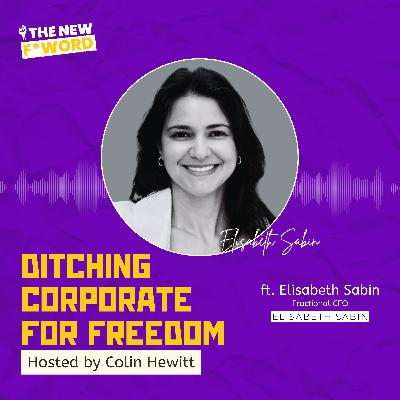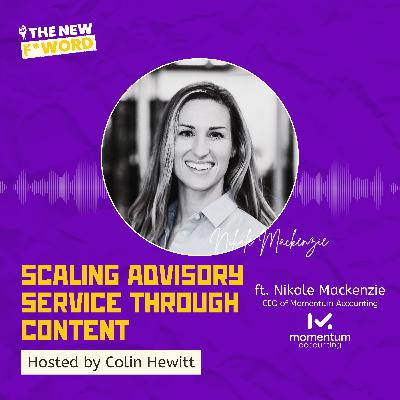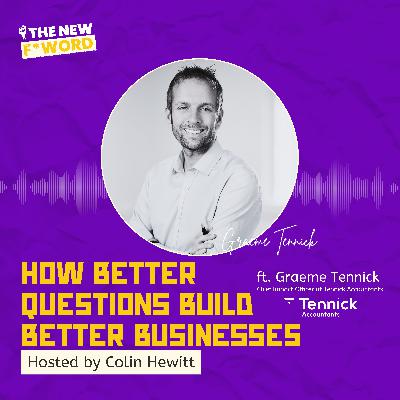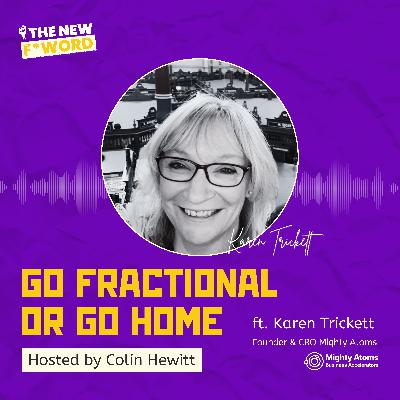Discover The New F*Word (F for Fractional Finance)
The New F*Word (F for Fractional Finance)

The New F*Word (F for Fractional Finance)
Author: The podcast for Fractional CFOs who want to master cash flow, financial strategy, and business growth.
Subscribed: 0Played: 0Subscribe
Share
© Colin Hewitt
Description
Welcome to The New F*word – the podcast exploring the rise of Fractional CFOs (yes, that F-word 😉) and how they’re reshaping cash flow, financial strategy, and business growth.*
We challenge outdated financial reporting and focus on forward-thinking, modern finance strategies that drive real results.
Each episode features finance pros, business leaders, and Fractional CFOs sharing practical insights, real-world stories, and actionable tools to help you improve cash flow, make smarter financial decisions, and scale your business.
I’m Colin Hewitt, your host and co-founder of Float (Cash Flow Forecasting). I’ll also share lessons I wish I’d known as a young entrepreneur navigating finance and cash flow.
👉 Tune in to The New F*Word and learn how to take control of your cash flow, optimise financial strategy, and stay ahead in business.*
newfword.substack.com
We challenge outdated financial reporting and focus on forward-thinking, modern finance strategies that drive real results.
Each episode features finance pros, business leaders, and Fractional CFOs sharing practical insights, real-world stories, and actionable tools to help you improve cash flow, make smarter financial decisions, and scale your business.
I’m Colin Hewitt, your host and co-founder of Float (Cash Flow Forecasting). I’ll also share lessons I wish I’d known as a young entrepreneur navigating finance and cash flow.
👉 Tune in to The New F*Word and learn how to take control of your cash flow, optimise financial strategy, and stay ahead in business.*
newfword.substack.com
31 Episodes
Reverse
In this Greatest Hits episode of The New F*Word Podcast, I revisit my conversation with Elliott Gaspar, Founder of Ox Consult and a hands-on advocate for redefining what it means to be a Fractional CFO.Elliott shares how his journey, from scaling startups to raising $600M in funding, shaped his perspective on finance as a true value driver rather than just a cost center. We dive into the different types of fractional CFOs emerging in the market, why the industry is still in its early days, and how he’s pioneering a model rooted in problem-solving, practical systems, and trusted founder relationships.From navigating the “edge of chaos” in high-growth startups to leveraging AI for smarter bookkeeping, Elliott gives a candid look at the challenges and opportunities shaping this fast-growing field.🔑 You’ll discover:* The three types of Fractional CFOs and why the hands-on builder stands apart* Why finance should be seen as a value driver, not a cost center* Common mistakes founders make when approaching startup finance* How AI is transforming bookkeeping and decision-making* The power of community and collaboration in scaling a fractional practice* Elliott’s personal journey from dyslexia to redefining success in both finance and family lifeElliott’s story shines a light on the future of fractional finance: flexible, tech-enabled, and deeply human. This is a public episode. If you would like to discuss this with other subscribers or get access to bonus episodes, visit newfword.substack.com
In this episode of The New F*Word, host Colin Hewitt is joined by Madeline Reeves, Founder and CEO of Fearless Foundry, for a wide-ranging conversation about building resilient businesses, the messy reality of advisory services, and why the finance industry needs fewer shiny tools and more strategy.What You’ll Learn:* How to navigate the AI hype cycle while maintaining focus on genuine business value* Why the traditional General Ledger model is becoming obsolete and what's replacing it* The critical difference between operational finance leadership and true CFO strategic guidance* How to build a successful fractional CFO practice while choosing between boutique and scaled models* Why community building and peer support are essential for modern accounting firm growthMadeline Reeves is the Founder and CEO of Fearless Foundry, an 8-year-old strategic consultancy specializing in go-to-market strategy and business development. With vast experience as a global business development leader for leading tech companies, she helps organizations from solo founders to billion-dollar enterprises optimize their market presence and growth strategies. Additionally, Madeline is the Founder of We Talk Money, the first-ever online network designed to connect underrepresented leaders in finance to industry opportunities and each other. This is a public episode. If you would like to discuss this with other subscribers or get access to bonus episodes, visit newfword.substack.com
In this episode of The New F*Word, host Colin Hewitt speaks with Jo Wood, Co-founder of The 6 Figure Bookkeeper and Hey Monika, about the evolving role of bookkeepers in modern business. Jo shares how she grew The 6 Figure Bookkeeper from 60 Facebook members to 28000, sold her multi-six-figure practice to prove bookkeeping businesses can be valuable assets, and co-founder Hey Monika, an AI-driven training platform giving bookkeepers real-world experience in a safe space.What You’ll Learn:* How to leverage AI and automation while maintaining valuable human insights in bookkeeping* Why building a tech stack is crucial for modern bookkeeping* How bookkeepers can transition from traditional services to higher-value advisory roles* Why confidence, not just technical knowledge, is key to successful financial advisory* How to create effective partnerships between bookkeepers, accountants, and fractional CFOs* Why embracing technology education and practical experience platforms like Hey Monica are reshaping professional developmentJo Wood is a pioneering figure in modern bookkeeping and financial education, known for co-founding The 6 Figure Bookkeeper. With a background in auditing and virtual FD services, she has grown a community of over 28000 bookkeepers and accountants while successfully building and selling her own multi-six-figure bookkeeping practice, Jo Wood Virtual FD Ltd. Jo is transforming the bookkeeping industry through innovative solutions, like HeyMonica, an AI-powered platform that provides practical experience for aspiring financial professionals.Episode Resources:* Jo Wood on LinkedIn* The 6 Figure Bookkeeper Website* Hey Monika Website* Bookkeeping Business From Home Podcast* The Bookkeeper Rises Book* Colin Hewitt on LinkedIn* Float Cash Flow Forecasting Website This is a public episode. If you would like to discuss this with other subscribers or get access to bonus episodes, visit newfword.substack.com
The Founder Who Learned the Hard WayWood built Receipt Bank from a startup to a £500 million exit to IRIS Software Group in 2024. During that journey, Receipt Bank eventually migrated to NetSuite as they scaled. Wood now says if today's technology had been available then, they would have stayed on their modular stack rather than making that expensive, complex transition.As someone who's lived through a painful ERP transition, Wood sees the opportunity to help businesses avoid this pain. The idea for Translucent centres around the fact that the general ledger is essentially an API layer, and works well for many businesses. There is a constantly evolving app ecosystem marketplace that enables businesses to plug in ones to fit their unique use cases. By providing this multi-entity system, businesses can have multiple Xero entities in the UK and Australia, a QuickBooks setup in the US, and a Pennylane in France. Businesses can use the tools that they know, yet create reports in one place, avoiding or delaying the ERP migration until a much more significant scale than would have been possible before.Translucent's core capabilities include automated group reporting with real-time FX conversion, intercompany reconciliation, treasury consolidation across currencies, and unified search across all entities. The platform operates as a data warehouse that syncs and harmonises information from Xero, QuickBooks, Sage, and Pennylane, enabling enterprise-level consolidation without forcing companies to abandon familiar SMB accounting tools.The market response has been favourable. Translucent achieved 1,000 Xero entities in just 168 days - claimed to be the fastest any Xero app has reached this milestone. The company has raised £7.7 million across pre-seed and seed rounds, attracting notable investors including Craig Walker (Xero co-founder/former CTO) and Gary Turner (Xero co-founder/former UK MD) as board members.The Fractional CFO Movement Is Accelerating This ShiftThe fractional CFO movement is driving a fundamental change in how growing companies approach their finance stack. These strategic partners bring experience from their time at multi-entity organisations, and they're proving that modular finance stacks are not just viable–they're smarter.“Our experience of the market is most people do not want to leave Xero. They want to stay, but they have a problem. That problem may be forecasting, it may be intercompany automation, prepayments, consolidated reporting, working at AP groups, across the group. It can be all sorts of different things, but normally they are running this, you know, these multiple zeros, this multi entity setup, and they have a burning problem. And what we try to do is to help them with that first problem”Unlike permanent CFOs who might default to familiar enterprise solutions, fractional CFOs see the same problems across dozens of clients. They watch companies struggle with ERP implementations, and they are starting to see alternative paths becoming viable, bringing both significant time and cost savings.This positions them perfectly to challenge the old orthodoxy. When a fractional CFO with experience across 20+ implementations says, "you don't need NetSuite yet," that carries weight that transforms boardroom conversations.The Hidden Reality: ERPs Are Failing at ScaleThe statistics behind ERP implementations tell a sobering story that fractional CFOs are increasingly aware of. According to Gartner research, 55-75% of ERP projects either fail outright or don't meet their intended objectives. Only 23% of all implementations are considered successful by organisations' own standards.Major companies are reversing course on massive ERP investments. Lidl scrapped its €500 million SAP implementation after seven years, reverting to legacy systems. Avon's $125 million SAP failure saw 33% of sales representatives quit rather than struggle with the complex interface. Mission Produce lost $22.2 million in gross profit when their ERP implementation left them unable to track basic inventory operations.Cost overruns represent perhaps the most shocking revelation. Organisations experience an average 189% budget overrun, meaning ERP projects typically cost nearly three times the initial estimates. Timeline delays compound the financial pain, with failed projects experiencing schedule overruns averaging 230%.Notably, only 33% of companies report satisfaction with their ERP systems, and 56% of organisations have a "high degree of purchase regret" over their largest technology purchases, with ERPs frequently topping the list.The Rise of ERP Fatigue Drives SimplificationA significant shift is underway as companies experience "ERP fatigue" - exhaustion with monolithic systems' rigidity, costs, and complexity. By 2027, IDC forecasts that 75% of global businesses will begin replacing monolithic systems with modular, API-driven solutions.The symptoms of ERP fatigue are consistent: inability to adapt quickly to business changes, implementation timelines measured in years rather than months, heavy interfaces that frustrate users, vendor lock-in that limits innovation, and customisation bottlenecks that constrain operations.Gartner's evolution from promoting "postmodern ERP" to "composable ERP" reflects industry recognition that one-size-fits-all solutions no longer work.Why the "Xero-NetSuite Gap" Is Now an AdvantageThere used to be a genuine gap where companies outgrew Xero or QuickBooks but weren't ready for full ERP complexity. That gap has largely disappeared thanks to modern tools that solve specific problems without requiring complete system replacement.Translucent handles multi-entity reporting, unified search, and intercompany reconciliation - but other tools are also adding powerful additional functionality to the multi-entity tech stack. Float recently launched its consolidated short-term cashflow forecasting and reporting to bring direct method 13-week cashflow reports across the whole organisation.These aren't simply band-aid solutions. They're purpose-built tools that often work better than ERP modules because they're designed for specific use cases rather than trying to be everything to everyone. They're also improving at a faster pace with the advent of AI.The Cost of Delaying Is Now Massive SavingsThe traditional logic suggested that delaying ERP migration would eventually force expensive, rushed implementations. The opposite has proven true. Companies that resist the ERP pressure are saving hundreds of thousands - or millions - while their competitors struggle with complex migrations.Michael put it like this:“What we try to do at Translucent is allow them just to buy the apps or the modules that they need at a very cost-effective price…without having to get bogged down into a project of, ‘I’ve got to migrate my accounting software. But you don’t need to rip up everything else you’ve got just to now scratch that itch. You can keep everything else in place and solve that problem.”The numbers tell the story: NetSuite implementations start at £200,000 for mid-market companies and can easily exceed £1 million with customisation, training, and disruption costs. A typical Xero + Translucent + Float + specialist tools approach might cost £5,000-£10,000 annually - a fraction of the ERP investment with far better user adoption and faster implementation.More importantly, that modular investment preserves optionality. If a company eventually needs true ERP capabilities, it can migrate individual functions over time rather than forcing a "big bang" replacement that puts the entire business at risk.With 56% of organisations experiencing high purchase regret and failure rates exceeding 60%, recommending an ERP migration is increasingly difficult to justify. Meanwhile, the modular approach offers clear benefits: faster deployment, lower risk, incremental investment, and the ability to course-correct without organisational trauma.Today, by developing their knowledge of a modular-based tech stack, CFOs are positioning themselves as strategic advisers who help companies avoid unnecessary complexity rather than consultants who default to enterprise solutions. This differentiation becomes a competitive advantage as the market recognises that complexity often kills growth.The Bottom Line for Modern CFOsThe evidence suggests that traditional ERP implementations pose unacceptable risks for growing companies. With failure rates exceeding 60%, average cost overruns of 189%, and only 33% customer satisfaction, the promise of integrated systems too often delivers organisational trauma instead of transformation.The companies abandoning their ERP investments aren't failures - they're pioneers of a more pragmatic approach to enterprise technology. They're proving that modular, best-of-breed solutions can deliver enterprise-level capabilities without the complexity typically associated with them.For fractional CFOs advising growing companies, the message is clear: challenge the ERP orthodoxy. The technology landscape has evolved to the point where the "Xero-NetSuite gap" is no longer a limitation. Companies that resist the pressure to "graduate" to complex ERPs often find themselves more agile, more profitable, and better positioned for sustainable growth.When your clients hit those traditional ERP trigger points - multiple entities, complex reporting needs, or scaling operations - remember Michael Wood's insight: if today's technology had been available during Receipt Bank's growth, they never would have made the NetSuite transition. That's not a failure of ambition; it's the wisdom of experience.🎙️ Want to dive deeper?If you enjoyed these insights, dive deeper by listening to full episodes of The New F*Word Podcast here.If you’re finding this newsletter useful, why not share it with a fellow finance friend? And if you haven’t subscribed yet, don’t miss out on some of the exclusives we’ve got coming your way. We’re on the lookout for more
Most finance professionals (e.g. accountants and fCFOs) are still relying on outdated marketing tactics: generic websites, vague messaging, and a hope that referrals will carry the business.However, as Karen Reyburn shares, that approach no longer works.In this episode of The New F*Word, I sit down with Karen to chat about what really works when it comes to marketing for accountants and fractional CFOs. Karen shares practical insights on defining your audience, crafting compelling stories, and evolving your marketing as services change.Here are the main takeaways from this episode:* Boring marketing is bad for business. If your firm sounds like every other one, clients can't choose you. Make it human. Make it real.* Talk less. Listen more. Ask therapist-style questions: "How are things really?" Then build your messaging around what people actually say.* Get specific. The narrower your niche, the stronger your pull. Broad messaging attracts no one. Great marketing divides.* Done is better than perfect. You don’t need the perfect brand before you start showing up. Just start.* Creativity isn’t optional anymore. Whether you’re a fractional CFO or firm owner, your creative mindset is now a business asset.Listen now on Apple, Spotify, and YouTube.This episode is brought to you by Float, the cash flow forecasting software trusted by thousands of Modern Finance Leaders and businesses. Whether you're a growing company or a fractional CFO, Float is a cash flow forecasting tool that provides finance professionals with daily cash visibility for the businesses they serve and helps them manage and plan cash flow for any scenario they might face. This is a public episode. If you would like to discuss this with other subscribers or get access to bonus episodes, visit newfword.substack.com
Laura Linden, founder of Feisty FD, shares her journey from accidental finance expert to guiding female entrepreneurs to multimillion-pound exits. With 12 years of experience, she reveals key insights on avoiding valuation pitfalls, the critical role of historical cash flows, and why due diligence matters. She also highlights the value of corporate finance advisors and how gender influences risk-taking, aiming to empower women in business.Inspired by her daughter’s fearless spirit, Laura is dedicated to making finance accessible. She’s working on a book and app to boost women’s confidence with numbers. As AI transforms the industry, Laura stays ahead, offering practical advice on adapting and thriving. This episode is a clear, no-nonsense guide to mastering your business’s finances and unlocking its full potential. This is a public episode. If you would like to discuss this with other subscribers or get access to bonus episodes, visit newfword.substack.com
Adam Sher, CFO at Vero Capital, shares his journey from Big Four accounting to scaling tech ventures. He empowers Series Seed to Series A startups by streamlining financial operations and investor communications. His insights on SaaS metrics and valuations are invaluable for CFOs helping founders navigating growth.We explore small business challenges, from tariffs to global supply chain disruptions. Adam’s candid reflections on his own startup failures, paired with actionable strategies for managing churn and rising costs, offer founders clear, practical guidance to thrive in turbulent times. This is a public episode. If you would like to discuss this with other subscribers or get access to bonus episodes, visit newfword.substack.com
Wondering how to tame your startup’s financial chaos? I’m with Ciarán O’Donnell, fractional CFO and Own Your Numbers founder, who equips startups with the financial savvy to grow. We uncover how to spot cash flow traps, decode KPIs, and why EBITDA isn’t just jargon—it could shape your business’s exit value.Packed with wild stories and actionable insights, we explore how a part-time finance expert turns confusion into clarity without the hefty price tag. Whether you’re buried in spreadsheets or just want to boost your financial know-how, this episode’s got the spark you need. This is a public episode. If you would like to discuss this with other subscribers or get access to bonus episodes, visit newfword.substack.com
Curious about ditching a cushy corporate finance gig for the wild ride of a fractional CFO business? I sat down with Kat Willem-Kent, a trailblazer who traded a top firm for Fractional Finance, growing it from a one-woman show to a seven-strong team with HR disruption in her sights. Over lunch in London, she sparked the idea and mapped it out in a sunny Paddington square. Kat’s story is raw—bold leaps, scaling chaos, and balancing family life, all spiked with energy healing and manifestation.In this episode, she dishes on recruiting CFOs, managing client demands, and her killer tech stack (Xero, Fathom, Float). Beyond numbers, Kat’s driven by purpose, blending personal growth with big plans. Our conversation is punchy, real, and loaded with insights for entrepreneurs, finance nerds, or anyone hungry for a fresh take on business. This is a public episode. If you would like to discuss this with other subscribers or get access to bonus episodes, visit newfword.substack.com
This episode’s a bit different, I’m trying something new by bringing on not one, but two guests — Michael Spyrou and Tim Johnson, co-founders of Axcelera.I’ve been really curious about how the role of the fractional CFO is evolving, and these two are right at the forefront. Axcelera is a group of CFOs with a fresh approach—combining strategic financial planning with smart tech to help growing businesses thrive.Michael’s got over 20 years of finance experience across multiple countries and sectors. His focus? Helping SMEs get a grip on their numbers and make confident decisions. Tim’s background is in banking and entrepreneurship—he’s founded multiple businesses and even ran call centres in the Caribbean. Together, they’ve built something pretty special.In this chat, we get into:* Why the fractional CFO is so key for scaling businesses* The importance of delivering insight, not just information* How tech is transforming the finance function* What founders really need from their CFOIf you’re running a business or advising one, this is well worth a listen. This is a public episode. If you would like to discuss this with other subscribers or get access to bonus episodes, visit newfword.substack.com
Want elite execs without the big bill or long-term lock-in? I sit down with Stephen Halpin, the mind behind Portfolio XD, a team offering fractional C-suite talent—CEOs, CFOs, CMOs—on demand. Frustrated by consultancy roles where sharp strategies just sat unused, Stephen crafted a model that delivers real impact, not just slides. Post-COVID, Portfolio XD took off as SMEs sought flexible, high-calibre leaders to tackle funding rounds or global growth.Here’s the twist: it’s not just cost-effective—it’s a total rethink. Imagine a UK media firm landing a Toronto CEO or a bioscience startup tapping a Boston CCO, no recruitment hassle. Stephen breaks it down—speed, expertise, no risk for companies, and execs (not just retirees) love the flexibility. He’s upfront about the missteps too, like corporate pros stumbling in fast-moving SMEs. And his take on networks? It’s who you know that sparks the magic. This ain’t fluff—it’s raw, punchy, and might just make you rethink your own game plan. This is a public episode. If you would like to discuss this with other subscribers or get access to bonus episodes, visit newfword.substack.com
What’s it take to be a fractional CFO? I’m talking with Elliott Gasper from OxConsult. He’s a hands-on fixer who’s raised millions and scaled companies big-time. Now, he’s shaking up fractional finance.Elliot shares the three types of fractional CFOs he has identified so far and which bucket he falls under. The industry is still growing and with a lot of noise, business owners still don’t get what fractional CFOs do. But Elliot loves that because it’s a chance to make real impact for businesses.He also shared how having dyslexia as a kid got him labelled a “terrible employee.” Now? It’s his problem-crushing superpower. He’s also kicked off the Fractional Finance Forum—CFOs sharing battle scars and hacks. Solo gig, but teamwork wins.As I mentioned, I’m teaming up with Elliott for an upcoming webinar where we’ll be discussing the best finance tech stack for 2025 with industry experts:📅 Monday 24th March, 3pm (GMT)👇 Register now to secure your spot and get your finance function future-ready! https://lu.ma/rng2jp39 This is a public episode. If you would like to discuss this with other subscribers or get access to bonus episodes, visit newfword.substack.com
In this episode, I am joined by Daniella Wainwright (Wainwright Consulting), an inspiring fractional CFO who left the corporate grind to build a successful consulting business based on authenticity, mindset work, and a balance between business and well-being.Daniella’s journey is incredible—starting as a trainee accountant at 16, managing multi-million-pound businesses, and eventually shifting to fractional finance work. We talk about her growth, the power of networking, and key lessons she’s learned about marketing and personal branding, especially on LinkedIn.What really stood out to me was her focus on health and balance in a demanding industry. Daniella also shares how she built a collective of fractional CFOs, offering candid insights into the challenges and rewards of growing a service-based business.This conversation left me feeling inspired, and I think it’ll do the same for you. This is a public episode. If you would like to discuss this with other subscribers or get access to bonus episodes, visit newfword.substack.com
In this episode, I sat down with Rachel Marshall, founder of Magic Digits, an accounting firm for creative industries. Rachel’s story really resonated with me—she built her business from the ground up during the chaos of the pandemic, balancing career growth and family life.Rachel shared what it takes to scale a business, the challenges she faced, and how she went from being a one-woman show to building a team. She also gave us a peek into the details of business growth, from managing hiring and cash flow to creating a remote team that fits her lifestyle.Having transitioned from freelance to running her own company, I found Rachel’s lessons incredibly insightful—especially when it comes to making tough decisions, managing expectations, maintaining client relationships, and adapting as your business evolves. This is a public episode. If you would like to discuss this with other subscribers or get access to bonus episodes, visit newfword.substack.com
How can the right financial expertise accelerate growth for startups and scale-ups, without the hefty price tag of a full-time CFO? In this episode, Colin speaks with Stephen from Growth CFO about the fractional finance revolution. With experience both on the investor side and as a CEO, Stephen shares why fractional CFOs are a game changer for small and mid-sized businesses.Stephen highlights the importance of seasoned financial leadership, particularly during crucial growth stages, and how a fractional CFO provides not only operational oversight but strategic advice. Stephen discusses how businesses benefit from having experts who’ve ‘been there, done that’, and offers insights into building strong investor relationships and improving cash flow management.You’ll also hear about the challenges in the funding landscape, how fractional CFOs can help navigate tricky financial waters, and why embracing financial transparency early can set you up for long-term success. This is a public episode. If you would like to discuss this with other subscribers or get access to bonus episodes, visit newfword.substack.com
How can fractional CFOs change the way startups and scale-ups approach growth and financial strategy? In this episode, Matthew Powell, a seasoned fractional CFO, shares his journey from corporate finance at EY to running his own successful consultancy. Matthew discusses the significant advantages of bringing in a fractional CFO early on in a business’s life cycle, especially when it comes to fundraising, forecasting, and strategic planning.With years of experience in managing financial teams, Matthew explores the crucial role of finance leaders in startups, explaining how a well-structured finance function can be the linchpin for long-term success. He delves into the importance of establishing sound financial systems and processes, particularly in fast-growing companies, and why early-stage businesses can’t afford to ignore solid financial advice.Matthew also reflects on his time building Fluro, a peer-to-peer lending platform, and how he navigated challenges around scaling and fundraising. From tackling compliance hurdles to pivoting business models, his insights on financing, operational strategies, and cash flow management are invaluable for any growing business. This is a public episode. If you would like to discuss this with other subscribers or get access to bonus episodes, visit newfword.substack.com
What drives someone to transition from a stable corporate career to launching a fractional CFO practice? In this episode of The New F* Word podcast, we speak with Elisabeth Sabin, a newly minted fractional CFO, about her transformative journey into the world of fractional finance. Elisabeth shares the motivations behind her decision to leave corporate finance for a more flexible and fulfilling career, one that allows her to balance professional ambition with family time and a passion for helping small businesses thrive.We dive into the challenges Elisabeth faced as she transitioned to self-marketing and client acquisition in the fractional CFO space, discussing how long-term vision and a solid foundation are key to overcoming short-term uncertainty. We explore the evolving role of CFOs in business and how Elisabeth’s approach focuses on strategic financial guidance rather than just number crunching.Elisabeth also shares her passion for working with impact-driven businesses, where financial success aligns with social impact. We discuss the psychology behind financial decision-making, the importance of trust and emotional intelligence, and how Elisabeth plans to scale her practice sustainably while staying true to her values. This is a public episode. If you would like to discuss this with other subscribers or get access to bonus episodes, visit newfword.substack.com
How can fractional finance leadership transform small businesses, and why is the role of a fractional CFO so vital? In this episode of The New F* Word podcast, I speak with Nikole Mackenzie founder of Momentum Accounting, as we explore how outsourced financial services are reshaping the way small businesses manage their finances.Nikole shares her journey from traditional public accounting to launching Momentum Accounting in 2017, a company that helps businesses with revenue ranging from $1 to $10 million streamline their financial operations. We discuss the many reasons business owners turn to fractional CFO services, often out of frustration or urgent need, and how Nikole uses educational content to build trust and showcase the value her services provide.We also dive into the tools and strategies that have helped Nikole grow her business, such as her innovative cash potential calculator, and how she effectively uses marketing and branding to position Momentum Accounting as a leader in the fractional finance space. Nikole’s insights into managing a growing team and her vision for the future highlight how fractional finance can unlock growth and financial clarity for small businesses. This is a public episode. If you would like to discuss this with other subscribers or get access to bonus episodes, visit newfword.substack.com
In this episode of The New F Word, Colin sits down with Graeme Tennick, founder of Tennick Accountants, to explore the game-changing potential of fractional CFO services for small businesses. Graeme shares his journey from traditional accountancy to a model focused on genuine advisory relationships and a “sense of belonging” project, designed to bring more human-centred value to clients.Together, they explore the power of asking better questions, aligning business success with personal values, and making financial advisory services accessible to business owners. Graeme shares the pivotal moments that shaped his approach, from realisations during family moments to the pressures of COVID, which inspired him to rethink what clients truly need from their accountants.Whether you’re a business owner or simply curious about the evolution of financial services, Graeme’s insights help to reshape how we view success. This is a public episode. If you would like to discuss this with other subscribers or get access to bonus episodes, visit newfword.substack.com
Karen Trickett from Mighty Atoms joins us to explore the growing world of fractional leadership roles. Karen, who’s carved her path from Pepsi to Golden Charter, CMO to CEO, Karen is an experienced board executive focused on CX, marketing, and commercial strategies. Karen shares how her journey led her to fractional marketing and management and why she believes “the future is fractional”.Karen and I explore what sets fractional roles apart from freelance or interim positions, offering strategic leadership in finance and marketing that’s agile, cost-effective, and incredibly impactful. She reveals why fractional roles are essential for today’s businesses, especially startups and scale-ups looking to harness expertise without the overhead of full-time hires. With the UK business landscape ripe for change, Karen sheds light on how fractional talent is helping businesses thrive in challenging economic times.We also delve into how to choose the right fractional leader, discussing the importance of strategic thinking, chemistry, and the potential of this model to prevent common growth pitfalls. Karen’s stories of campaigns she's led highlight the powerful combination of creativity and analytics, offering practical insights for startups wondering if a fractional hire could be their next best move. This is a public episode. If you would like to discuss this with other subscribers or get access to bonus episodes, visit newfword.substack.com


